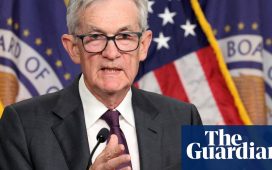Xi Jinping arrives in Europe on Sunday on a mission to ease escalating tensions that threaten to ignite a trade war between China and the EU.
On his first trip to the region since 2019, Xi will face tough talks in France on trade and Ukraine before enjoying a warmer welcome in Serbia and in Hungary, where soaring Chinese investment underlines both the benefits of close ties with Beijing and EU divisions on international policy.
“China is determined not to let its relationship with Europe slide further towards the direction of its ties with the US,” said Yu Jie, an analyst at UK think-tank Chatham House. “There will be a renewed charm offensive from Beijing, but it will equally give the EU tough warnings on trade protectionism”.
Xi’s top priority for his six-day visit would be damage limitation, Chinese officials said. The president is intent on countering a litany of trade investigations into Chinese companies by the EU, including a blockbuster anti-subsidy probe into electric vehicles expected to conclude in weeks.
EU officials have told the Financial Times that preliminary duties on EVs could be imposed in May, while permanent tariffs that need the support of a majority of member states could follow in November. Researchers at the Rhodium Group said the duties on Chinese EV imports to the EU could range from 15-30 per cent.
“China cannot afford the closure of the European market to Chinese companies,” said Abigaël Vasselier at Merics, a Berlin-based think-tank. “The main question is . . . how successful President Xi can be in altering the current trajectory on Europe-China relations.”

Emmanuel Macron, France’s president, has invited Ursula von der Leyen, European Commission president, to Paris to meet Xi on Monday.
Von der Leyen has advocated “de-risking” Europe’s commercial relationship with China and has blamed the EU’s huge bilateral trade deficit — €291bn in 2023 — partly on Beijing’s limits on market access for European companies. In recent years, the EU has fallen behind south-east Asia to become China’s second largest regional trade partner.
Xi intended to play hard ball, Chinese officials and analysts said. Behind the expected displays of public bonhomie and promises of Chinese investment, he would warn European leaders that duties on Chinese exports would elicit an uncompromising response, they added.
“China could impose restrictions on the export of materials needed to make microchips and on French exports to China and several other items,” said one Chinese analyst who asked not to be named.

Beijing has also signalled increasing willingness to impose its own retaliatory tariffs. Macron is expected to take up with Xi the cause of French cognac makers, after China in January launched an anti-dumping investigation into French brandy imports.
French brandy is the most imported liquor into China and tariffs would hit the profits of famous brands such as Rémy Cointreau, Pernod Ricard and LVMH-owned Hennessy.
France’s cognac industry association, the BNIC, said Xi’s visit was “a unique opportunity for an agreement” to resolve an “unjustified” Chinese probe that threatened a sector that directly and indirectly employing some 70,000 people.
While the talks in Paris are expected to be challenging, Xi’s visits to Serbia and Hungary would strike a much more positive tone, Chinese officials said. China sees Hungary as a genuinely loyal friend in the EU and has been showering the country with investment promises.
According to official Chinese estimates, accumulated foreign direct investment by Chinese enterprises in Hungary could reach €30bn by the end of this year — suggesting several additional billions of euros in investment are in the pipeline.
One project under discussion is a potential investment by China’s Great Wall Motor to build an EV plant, Chinese officials said.
“Hungary is greatly over-represented in Chinese FDI into the region, amassing more volume in the past two to three years than in the preceding decades,” said Daniel Hegedüs at the German Marshall Fund in Berlin.
“This is politics. Hungary has been loyal and reaps the rewards,” Hegedüs said.
But Xi’s visit to Hungary is sure to antagonise many leaders in western Europe. “Hungary is considered a pariah,” said one senior western European diplomat.
Even as the EU increasingly views China as a “systemic rival”, Hungary has become the main defender of Beijing’s interests. Between 2016 and 2022, it has used its veto power on several occasions to block European Council decisions condemning Chinese actions.
In addition, Xi’s visit to Serbia on Tuesday, the 25th anniversary of Nato’s accidental 1999 bombing of the Chinese embassy in Belgrade, could also alienate opinion in western Europe, the diplomats said.
After Russia’s full-scale invasion of Ukraine in 2020, the Chinese mission to the EU cited the 1999 bombing to explain Chinese sympathy for Russia’s argument that the western military alliance was responsible for the more recent conflict.
“Chinese people can fully relate to the pains and sufferings of other countries because we will never forget who had bombed our embassy in the Federal Republic of Yugoslavia,” a spokesperson for the mission said.
Indeed, the Ukraine war is set to loom large over Xi’s Europe trip.
Chinese academics said Beijing viewed the US as using the war to extend its hegemony over Europe, while putting pressure on China for its alleged role in supporting Russia.
They said Chinese leaders believed Macron wanted Europe to exercise more strategic autonomy from the US, an aspiration Beijing shared. However, Xi’s friendship with Russian President Vladimir Putin means anything he says on Ukraine will be viewed with deep distrust in much of Europe.
Still, Macron is expected to try to convince the Chinese leader to use his influence with Putin to change the course of the war, even though similar efforts during a visit to China last year did not bear fruit.
“Our aim is to encourage China to use the levers at its disposal with Moscow to influence Russia’s calculations and try and contribute to a resolution of this conflict,” an Elysée official said.







